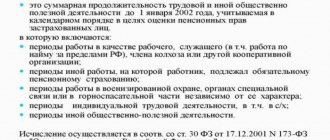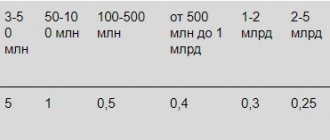Who are they
Depending on their responsibilities, these officials are divided into several categories:
- working with debtors and collecting money from them to repay the debt;
- armed guards guarding judges and other participants in the hearing;
- leaders.
Their activities are regulated by the relevant Federal Law, which we will try to understand in this article.
Functions of the Federal Bailiff Service
The roles of these bodies include:
- search for the defendant's property;
- arrest and confiscation of found items;
- valuation of seized property;
- its implementation.
Video on the topic:
Bankruptcy of individuals
from 5000 rub/month
Read more
Services of a credit lawyer
from 3000 rubles
Read more
Legal assistance to debtors
from 3000 rubles
more
Write-off of loan debts
from 5000 rub/month
More details
Job responsibilities
In addition to collecting money and alimony payments, bailiffs also enforce decisions in the following cases:
- Establishing a procedure for communicating with the child;
- Choosing the place of residence of a minor with one of the parents;
- Evictions of citizens, including those previously deregistered by decision of a federal judge;
- Carrying out work on dismantling structures and structures.
Such measures require the most global efforts, because working moments are carried out directly with citizens who rightfully have their own views and concepts.
Bailiffs working in courts to organize the established order
A separate discussion is required by specialists who spend all their working time within the courthouse: starting from the Constitutional Court and ending with the justice of the peace of some small, territorially speaking, area.
Their main responsibilities are:
- Ensuring security - for this, at the entrance they inspect and check all visitors for the presence of explosive, piercing cutting tools;
- Preventing the use of violence against court staff or parties to the case (both civil and criminal);
- Assisting in the transfer of documents at a court hearing or on behalf of a judge;
- Delivery of citizens evading subpoenas - by force.
That is, unlike the first type of specialists, law enforcement officers are more concerned about the immediate safety of citizens. For this reason, their wages, benefits and other working conditions are determined differently.
Senior bailiff
Each territorial department has a senior specialist who is vested with the authority to manage the staff and ensure that the latter perform public service. In this regard, he is entrusted with the following responsibilities:
- Coordination of department activities;
- Personnel policy issues (besides hiring and firing);
- Responses to complaints and requests;
- Conducting training and seminars;
- Supervising certain controversial enforcement proceedings.
At the same time, along with a large volume of responsibilities and an increased salary, the senior bailiff is also given the amount of responsibility that is assigned to him by the Office.
Heads of management
Each region of our country has an Office of the Federal Bailiff Service. He performs administrative and supervisory functions, namely:
- Personnel policy (recruitment of applicants, training, holding competitions), including subsequent dismissal;
- Accounting and payments related to it;
- Conducting inspections (internal in the region with subsequent transfer to the “head” department).
That is, they do not directly resolve issues related to enforcement proceedings, but they can provide methodological recommendations.
Rights and obligations of bailiffs 2021
They are quite closely related. But, before we get to know them, let's see what laws and regulations they are spelled out in.
Regulation at the legislative level
The activities of these civil servants are strictly regulated. This is written in:
- Constitution;
- Code of the Russian Federation on Administrative Offenses;
- Regulatory acts of the Ministry of Justice;
- Civil Code of the Russian Federation;
- Presidential Decree No. 1316, issued on October 13, 2004;
- Federal Law No. 118 of June 21, 1997;
- Federal Law No. 229, which entered into force on October 2, 1997.
Official actions to ensure the established order of court activities
According to current legislation, OUPDS authorities must:
- ensure that judges and other participants in the proceedings are safe while in the building (and in some cases, outside it);
- protect case materials and material evidence during the period when they are delivered to the point of proceedings;
- carry out the orders of the chairman of the proceedings;
- monitor public order;
- bring citizens who avoid appearing (only in accordance with the necessary resolution);
- stop crimes and other violations, as well as report them to the police department and the head of the investigation agency;
- guard the premises of the FSSP and the court;
- accompany persons with foreign citizenship or without it at all to special organizations or to the border of the Russian Federation where checkpoints are located (based on the necessary documentation on forced movement);
- undergo specialized military medical examination, training, and aptitude testing conducted every year;
- cooperate with the Department of Internal Affairs, military police of the Russian Armed Forces, as well as with others who guard or escort those arrested;
- assist in the search and detention of those who are hiding from investigation and inquiry or trial;
- assist the employee during enforcement proceedings, as well as the investigator.
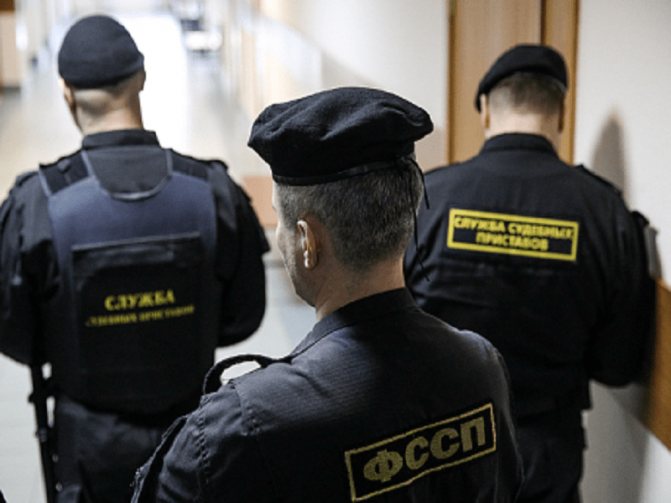
How to collect money from a debtor if he is a bailiff?
Recently, the bailiff service has been very active in talking about its activities in the press. The media is full of reports: “Bailiffs are conducting a raid at traffic police posts”, “Today the bailiffs went on a raid with tax service employees.” There is a feeling that the debtor, as in that famous song, cannot hide anywhere, cannot hide.
However, in practice, a collector may face an interesting situation - collection under a writ of execution from a debtor, who himself is an active employee of the bailiff service, namely a bailiff.
As you know, debt is not an offense in itself and anyone can become a debtor due to a combination of certain circumstances. For example, you may not calculate your financial capabilities and fall behind the bank loan repayment schedule. One of your relatives may get sick or property may be damaged. Civil and commercial risks lie in wait for everyone everywhere, and a bailiff may also become a debtor, including in enforcement proceedings.
After researching information on this topic, I found that this is not such a rare situation. There is sad information that sometimes bailiffs abuse their powers in order to evade paying the debt, and choose criminal methods for evasion.
Thus, a recent incident that occurred in the Omsk region is very indicative. There, the head of the Tevriz district bailiff department, using his official position, illegally completed enforcement proceedings against himself with a debt under a loan agreement of 460 thousand rubles. The investigative department of the Investigative Committee under the Prosecutor's Office of the Russian Federation opened a criminal case on this fact on charges of abuse of power of the former senior bailiff of the Tevriz district bailiff department, dismissed in April 2009.
As explained by specialists from the anti-corruption department of the Omsk Department, citizen N., being in the position of head of the Tevriz ROSP, using his official position, illegally ended enforcement proceedings against himself. Having a debt under a loan agreement in the amount of more than 460 thousand rubles, N. drew up an act of impossibility of collection and a fictitious revocation of the writ of execution by the recovering bank.
Due to the fact that this topic seemed interesting to me, I tried to draw up an approximate algorithm for recovery from a bailiff. First of all, the bailiff is a civil servant and receives a “white” salary. Therefore, it is most advisable, if the debt under the writ of execution is no more than 25 thousand rubles, to send the exactor himself a writ of execution to deduct the amount from the debtor’s earnings in accordance with Art. 9 Federal Law “On Enforcement Proceedings”. To do this, you need to write an application addressed to the chief bailiff of the constituent entity of the Russian Federation, attach a writ of execution to it and submit it to the office of the territorial Office of the Bailiff Service. For example, if the debtor-bailiff lives in Omsk, then the writ of execution must be sent to the Office of the Federal Bailiff Service of Russia in the Omsk Region.
If the amount of collection exceeds 25 thousand rubles, the writ of execution must be presented to the bailiff service at the debtor’s place of residence, as required by Art. 33 Federal Law “On Enforcement Proceedings”.
While communicating with one of the bailiffs, I learned that their Office has the following procedure: if the debtor is an employee of the bailiff service (not necessarily a bailiff), then the enforcement proceedings are transferred for execution to the interdistrict department for the implementation of control enforcement proceedings of the Office . This ensures maximum objectivity and impartiality in the execution of enforcement proceedings.
In any case, the bailiff cannot carry out enforcement proceedings against himself, and is obliged to recuse himself in accordance with Art. 63 Federal Law “On Enforcement Proceedings”. If the bailiff lives in the same area in which he carries out his activities (which happens quite often), then all colleagues in the department should also recuse themselves, since there are doubts about their impartiality.
In this situation, it would be reasonable for the chief bailiff to transfer the proceedings against the bailiff for execution to the interdistrict department for the implementation of control enforcement proceedings.
As I noted, the bailiff receives a “white” salary, in connection with which it will be necessary to petition the bailiff (who is conducting enforcement proceedings against the debtor-bailiff) to send to the accounting department a copy of the writ of execution and the deduction order 50% of earnings.
While actions are being taken with the bailiff’s property (if any), 50% of the bailiff’s earnings will be withheld monthly to pay off the debt. Moreover, in connection with the amendments made to the Federal Law “On Enforcement Proceedings” in February 2008, enforcement proceedings no longer end when a copy of the enforcement document is sent for deductions from the debtor’s earnings.
Thus, it will remain in execution until the debt is fully repaid. If the amount of debt is large and the deductions will be made for a long time (several years), you can periodically submit petitions to check the property status of the bailiff and file a penalty against him.
As you can see, the current bailiff does not have many opportunities to evade payment of the debt within the framework of enforcement proceedings and there is a very high probability that the debt will be collected in full.
Finally, I’ll add that the bailiffs themselves started an interesting discussion on their Internet forum on the topic outlined in this article, in which anyone can take part
When collecting funds for the maintenance of a minor
If you don't pay child support, then employees have a reason to visit you. In this area, the powers of FSSP bailiffs include:
- act in accordance with professional ethics;
- carry out duties based on legislation, and also prevent infringement of the rights of those participating in the production;
- non-disclosure of family or personal secrets of all parties;
- exclusion of interest and actions only within the framework of the law;
- conducting the process in full, observing the established deadlines.
A variety of methods are used against debtors to force them to pay their debt. But the most common ones include a ban on leaving the Russian Federation or seizure of property. But there is a list of property that is prohibited from being confiscated:
- household items: kitchen utensils, food, clothing, etc.;
- money, if their amount does not exceed the established subsistence level;
- things that are the only source of income, for example, a laptop or car;
- housing, but only if you have nowhere else to live (an exception to the rule is mortgaged apartments);
- objects belonging to the spouse or other family members (provided that this is confirmed by documents).
Thus, the bailiff cannot take any property from you. The permitted list is strictly defined by law.
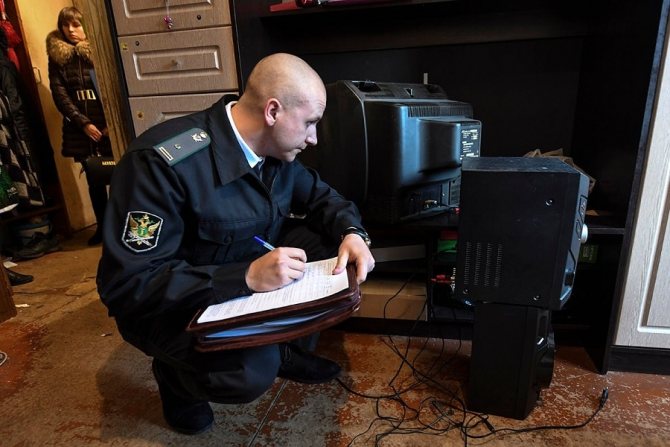
Debt collection
Based on the articles of Federal Law No. 118, an employee must:
- execute all documents correctly, completely and on time;
- give all participants the opportunity to study the documentation and case materials, as well as make extracts and copies;
- consider applications, as well as issue the necessary orders, set appropriate deadlines and explain the rules for appealing;
- in case of personal interest, withdraw from the process;
- engage in the receipt and processing of personal information, if necessary, in order to carry out production correctly and on time;
- conduct a case of an administrative offense based strictly on existing laws;
- notify the senior bailiff about detected signs of a crime.
Read What is loan debt restructuring - what does it mean in simple words and how it works

Remember that the employee can seize your property, resell it, and pay off the debt with the proceeds. However, there is a caveat here: an arrest can only be carried out in the presence of two witnesses, and objects included in the list of exceptions cannot be confiscated.
All seized items are described in the document. After this, the bailiff must draw up an act of seizure, put his signature on it, as well as the witnesses and the defaulter.
Important: if you refuse to sign, the paper does not lose its legal force. A special note is made in it.
After this procedure, you will, unfortunately, no longer be able to use the described property.
Basic principles of the state civil service
In accordance with the Federal Law on enforcement proceedings, the basic principles that should guide the bailiff are:
- Honesty;
- Openness;
- Legality;
- Deadlines.
Only by observing all the rules and not abusing his powers can a bailiff be considered a professional in the field of execution of punishment. After all, every executed court decision is a big step in resolving civil and administrative disputes.
According to the writ of execution
As we said above, a FSSP employee must act strictly in accordance with the law. But every duty has its “but”. Let's see which one:
| What can it do | Exceptions |
| Come to the debtor strictly between 6 am and 10 pm | Before or after this time, as well as on weekends, visits to bailiffs are prohibited by law |
| Seize property only if its owner is in debt | Do not touch property that is not subject to seizure |
| Give warnings to the defaulter about the possibility of harsh measures to collect the debt | Threaten life or health |
| Pick a lock if you don't open the door | Provided that you legally own the property |
The employee must also:
- notify the parties to the process about all its stages;
- carry out collection actions based solely on a court order.
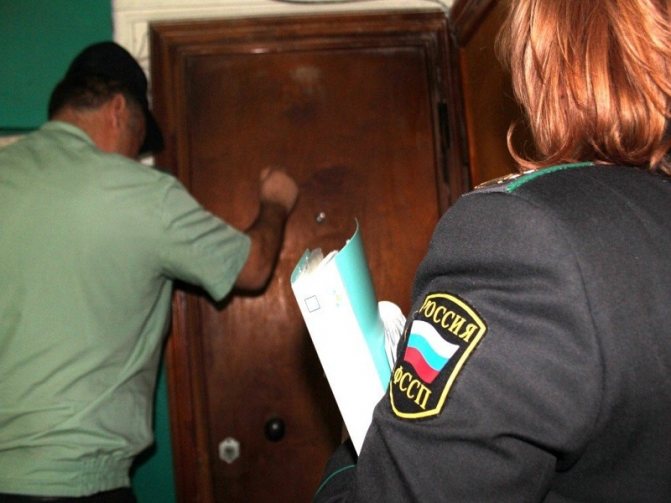
On the implementation of court decisions
According to Federal Law No. 229, the contractor has the following list of powers:
- Invitation to receive a debtor or collector using a summons, call or other method in accordance with legislative acts.
- Collection of information from the parties necessary for the correct conduct of the case;
- Requesting clarification from the recipient and the debtor, as well as certificates and other necessary documents.
- Carrying out checks, which includes receiving and reviewing financial documentation through the employer.
- If the employee has written permission from the senior bailiff, he has the right to enter the defaulter’s premises.
- Putting on the wanted list a person who has a debt, as well as his property.
- Use non-residential premises to store confiscated property, as well as use the vehicle of the defaulter or collector to transport valuables. This is done only with the consent of the parties, but all costs are borne by them.
- Work with applications and petitions.
- Control and restriction of travel outside the borders of the Russian Federation.
- Carrying out other actions in accordance with production and assisting its implementation.
Does a bailiff have the right to seize a pension?
Alas, according to current legislation in force today, a FSSP employee can confiscate pension accruals, which include payments due to old age or disability.
But there is also an exception here: the employee cannot withdraw income from the loss of a breadwinner.
The amount written off from the debtor is set in accordance with the size of the debt. Most often it does not exceed 50% of the debt, but in some cases it can increase to 70 percent. For example, if it is necessary to compensate for harm caused or moral damage.

Can a bailiff touch a bank account?
During collections necessary to repay a debt, the bailiff has the right to confiscate not only valuable property, but also the defaulter’s money lying in the bank.
It is important to note that write-offs can be made not only from card savings, but also from settlement savings. But, in any case, for such actions the performer must have compelling reasons, such as:
- order or order of the court;
- an order to collect debts or other types of costs from an organization vested with such power and control functions (for example, a pension fund);
- availability of a writ of execution.
But there is a list of savings that the employee does not have the right to recover:
- compensation for personal injury;
- benefits paid due to the loss of a breadwinner;
- due to disability or injuries acquired during work;
- compensation issued due to radiation or man-made disasters;
- money issued to care for a person who is disabled;
- reimbursed funds for travel or purchase of medications;
- benefits for the death of a person or the birth of a child, including maternity capital;
- reimbursed amounts for moving to another region for employment.
How much can bailiffs write off from wages?
If the bank card is only a salary card, then you need to inform the employees about this. In this case, they can withdraw no more than 50% of the money received into the account last time, regardless of how many writs of execution were received at the debtor’s place of employment. This point is spelled out in Federal Law No. 229, Article 99 Part 2.
Read How to write a statement about the inaction of bailiffs: a sample complaint against FSSP employees

Confiscation of driver's license
More recently, changes appeared in Federal Law No. 229, namely in Article 67 Part 1. Now bailiffs can seize another document from defaulters.
It is important to note that this seizure is temporary and continues until the debt is repaid.
Such a restriction can be used for both individuals and legal entities, in particular individual entrepreneurs, if they do not:
- compensated for damage to health or due to the death of the breadwinner;
- paid alimony;
- compensated for moral or property damage that was caused as a result of the crime committed;
- covered harm of a non-property nature associated with the upbringing of minors.
Employees can use this power only if the deferment period has ended and the debtor has not complied with the requirements of the writ of execution.
Features of interaction with bailiffs
Unfortunately, in the modern world, the duties of a bailiff are not always legal. The media often highlight cases of abuse of power when law enforcement officers act outside the bounds of the law. There are situations in which Themis employees violate, for example, the deadlines for the execution of proceedings, continue to carry out enforcement activities after the termination of the proceedings in the case, and sell property seized during the case for personal purposes.
In any of the cases that are not legal, the injured citizen has the right to appeal the actions of the bailiff. To do this, a complaint is sent to an official or body in court. It is submitted no later than 10 days from the moment the unlawful act was committed.
If a citizen has not received timely information about the time or place of enforcement actions, as well as about the refusal to take an action, then the period within which to appeal the action begins from the day when the specified person received the necessary information.
In most cases, regardless of whether a citizen has a debt to the bank or alimony debt, work begins with the submission of the necessary documents from the other party to the court. Based on the decision made, the bailiffs are already starting to work.
The duties of the bailiff to collect the debt begin after the bank has filed a lawsuit against the debtor. For the bailiff, only the period of non-payment matters; the size of the amount in this case is completely unimportant. The only case when the duties of the bailiff cannot be fulfilled in relation to the debtor is the proven objective impossibility of paying the debt. In such a case, the provision caused by the impossibility of collection shall apply.
We suggest you read: If the heir has not entered into the inheritance within 6 months
In addition, there are situations where bailiffs also interact with military registration and enlistment offices, police and other government agencies.

The court removes or imposes obligations. It is almost impossible for a bailiff who carefully fulfills his duties to be caught negligent. However, when faced with the work of the service, it is necessary to clearly know the rights and obligations of the debtor and the bailiff.
What can bailiffs arrest in an apartment?
According to the law, FSSP officers can confiscate any valuable property (with the exception of the list established at the legislative level), such as electronic and household appliances, money if their amount is above the subsistence level, jewelry, etc. But please note that these things must belong specifically to the defaulter. The objects of spouses or other family members cannot be seized if there are documents confirming their right of ownership.
What is prohibited from confiscation
This point is spelled out in the Civil Procedure Code of the Russian Federation. According to it, arrest cannot be imposed on:
- household and electronic appliances, as well as essential items (for example, a refrigerator);
- food;
- money, provided that their amount is less than the subsistence level;
- things that are the only source of income (for example, a car or a computer, but only if their cost is below 100 minimum wages);
- pets (except those used in commercial activities);
- personal property, except jewelry and decorations;
- property that provides normal living conditions (the clause applies to people with disabilities);
- gifts, awards, orders, etc.;
- property assets already pledged in other cases.
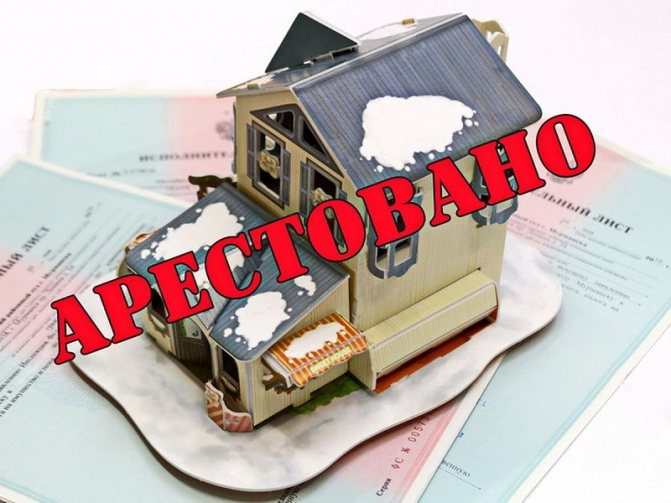
But at the same time, the perpetrators can arrest:
- housing (except for cases when it is the only one for the debtor and his family members);
- car or other vehicle;
- bank account (both current and credit).

